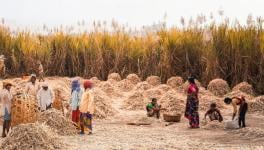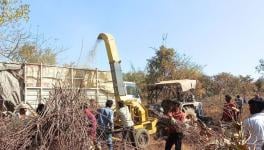How Farmers May Shape Assembly Results
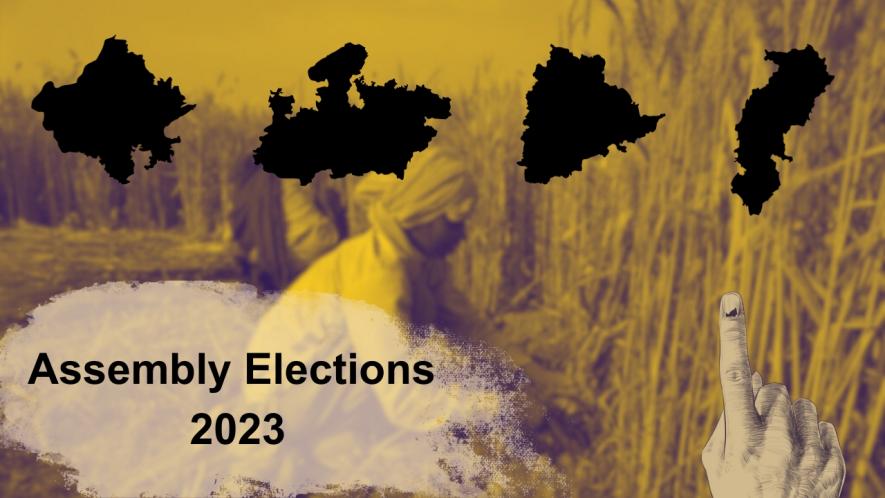
Since Chhattisgarh was carved out of Madhya Pradesh in the year 2000, both have followed a similar electoral trajectory with both the states being ruled by the Bharatiya Janata Party (BJP) for a long period and voting it out in 2018 Assembly elections. Then their paths diverged.
In Chhattisgarh, Congress won the 2018 Assembly elections decisively, getting 68 of the 90 seats with 43% vote share. BJP was confined to 15 seats with 33% votes. In MP, too, Congress won, but by a whisker – it got 114 seats in a 230-member House with 40.89% vote share while BJP got 109 seats and 41.02% votes. Later, in 2020, BJP upturned the mandate by getting the support of a group of defected Congress MLAs and returning to power.
On December 3, results are awaited for the Assembly elections held recently in five states, including Chhattisgarh and MP. Opinion polls and diverse media reports suggest that Congress will retain Chhattisgarh while there is a neck-and-neck battle in MP, with many observers predicting that Congress has an edge.
So, why this divergence since 2018? Elections outcomes in India are determined by myriad factors. But one, often neglected factor, is the farmers’ preferred choice. With farming under multiple stresses and returns from farming diminishing, discontent or otherwise among the largest classes of voters is obviously going to shape these election results.
MSP and Procurement
One key factor in determining the farmers’ economic condition is whether they are able to get better incomes through the sale of their produce. The Minimum Support Prices (MSP) for key crops, such as wheat and paddy, are fixed by the Central government and are below the levels demanded by farmers’ organisations. But the more crucial issue is whether government agencies are procuring the produce sufficiently, because private traders usually buy below the declared MSP. So, widespread procurement is a kind of proxy indicator for how much farmers are benefitting economically.
Let us look at the procurement policies of the state governments in the four bigger states that have recently gone to polls. State governments buy directly in these states by setting up procurement centres and use the foodgrain for their state’s Public Distribution System, with any leftover being deposited with the Central pool. Data for procurement of wheat and paddy is taken from Food Corporation of India (FCI) for the following analysis.
MP and Chhattisgarh
As can be seen from the chart below, MP and Chhattisgarh show different trajectories of procurement of the two main crops – wheat in MP and paddy in Chhattisgarh.
In MP, wheat procurement was averaging between 64 and 73 lakh metric tonnes (LMT) per year till 2019-20. Then, in the two pandemic years of 2020-21 and 2021-22, this almost doubled to 129 LMT. This had created a sensation at that time, as MP surpassed even Punjab in wheat procurement.
But, in 2022-23, wheat procurement fell steeply to a mere 46 LMT due to the possibility of export at lucrative prices – an idea spread and encouraged by the BJP Central and state governments. The Central government, however, soon banned exports and the wheat was stuck – either with farmers or with traders.
In 2023-24, wheat procurement has recovered somewhat to 71 LMT, which is still some 45% below the peak levels a couple of years ago. The net result: wheat farmers are highly discontented with the performance of the government. Other schemes or promises to compensate farmers for the difference between the market price and MSP have also floundered.
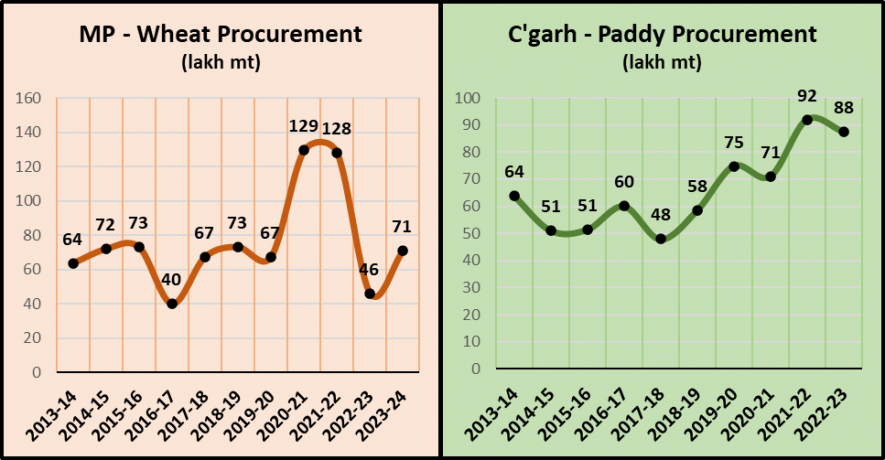
Chhattisgarh, on the other side, presents a markedly different picture (See above chart). Procurement of paddy, the state’s main crop, has been rising steadily. In 2018-19 it was 58 LMT which stands at about 88 LMT in 2022-23, the last year for which the complete data is available.
In addition, the state has been paying an additional Rs.600 per quintal over and above the declared MSP of paddy, and it also pays Rs.9,000 per acre as input subsidy to farmers, according to reports.
Although this doesn’t mean that the farmers’ dire economic crisis has been resolved completely, this does provide much needed relief to them. These policies appear to have consolidated farmers’ support for the Bhupesh Baghel-led Congress government in the state.
Rajasthan - Indifferent Procurement
Rajasthan has made considerable strides in expanding irrigation and hence foodgrain output, although coarse grains, which require less water, still form a significant share of the state’s farm output. Procurement of these coarse grains, like bajra, jowar, etc., is very poor. Wheat procurement rose to a peak in the pandemic years like everywhere else, but has plummeted starkly since then. (See chart below)
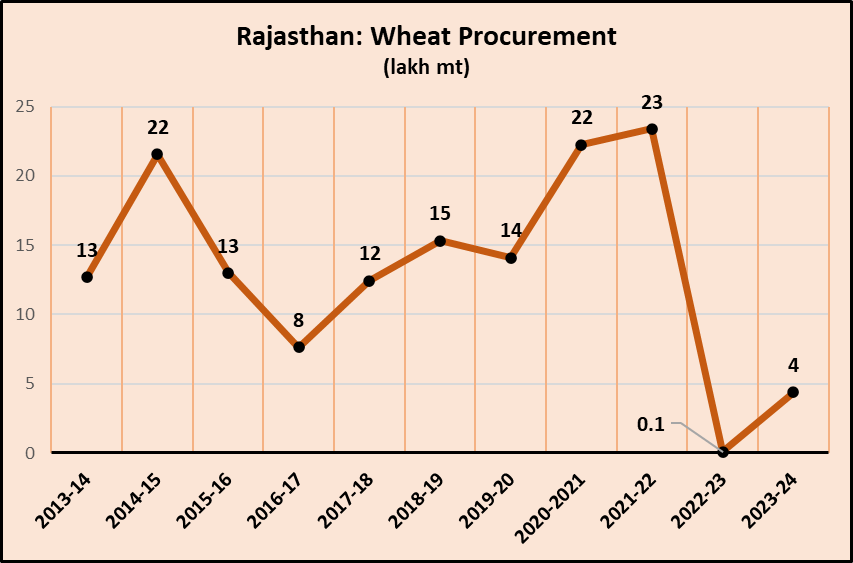
In 2022-23, wheat procurment was negligible and in 2023-24, it increased to just 4 LMT, almost one-fifth of the peak two years ago. Despite the Ashok Gehlot-led Congress government’s many other positive steps, on some of the crucial issues that affect a large number of people, it is perceived as lagging.
Farmers are aggrieved because of the indifference to their economic woes while industrial workers have been suffering very onerous conditions of work and low wages ushered in by labour reforms initiated by the previous BJP regime in the state, but have remained in place under the incumbent. It is generally reported that the electoral battle in Rajasthan is neck-and-neck between the BJP and Congress.
Telangana – Good Procurement, Failing Government
Under the Bharatiya Rashtra Samithi (BRS) government led by K. Chandrasekhar Rao, paddy procurement has zoomed up dramatically in Telangana. From about 24 LMT in 2014-15, when the state came into existence, paddy procurement touched 132 LMT in 2022-23. (See chart below)
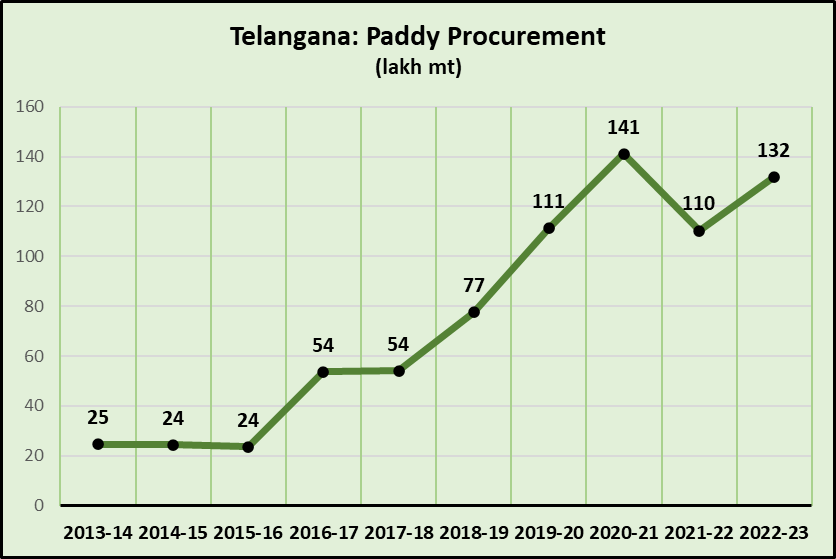
This, along with other welfare policies, has created a strong support base for the ruling BRS. However, persistent allegations of corruption, nepotism and continued neglect of more deprived sections, such as landless labourers, tenant farmers and dalits/adivasis are eroding this base. The limits of pleasing farmers with better procurement are clearly visible, but such is the impact that BRS remains a weighty contender in these elections.
Farmers Continue Protest
While results for the current round of Assembly elections will be declared on December 3, it is clear that farmers’ vote will play a big role in the outcome. The demands raised by farmers over the years – raising MSP, increasing procurement, restricting input costs, etc. – and the struggles around these issues have created a new awareness that is reflected in voting.
In the absence of a positive response to these demands, farmers tend to get more influenced by other political tactics and their voting gets fragmented. This may buy some time for parties or state governments that do not pay heed to the farmers’ problems. But ultimately, they will have to pay a price.
As can be seen in the ongoing ‘Mahapadavs’ being organised by farmers organisations and trade unions in district headquarters and state capitals on November 26-28, the burning issues falling incomes of farmers and workers are still roiling large sections of people.
Get the latest reports & analysis with people's perspective on Protests, movements & deep analytical videos, discussions of the current affairs in your Telegram app. Subscribe to NewsClick's Telegram channel & get Real-Time updates on stories, as they get published on our website.









